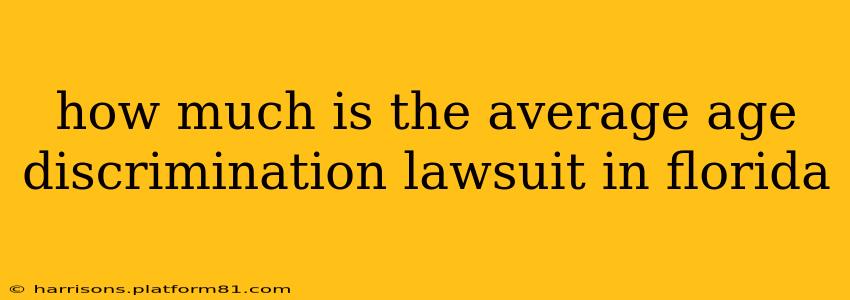Age discrimination in the workplace is illegal in Florida, as it is across the United States, under both federal and state laws. While there's no publicly available database detailing the exact average settlement or judgment amount for age discrimination lawsuits in Florida, several factors significantly influence the potential payout. Understanding these factors is crucial for both employers and employees facing such situations.
What Factors Determine the Value of an Age Discrimination Lawsuit in Florida?
The potential compensation in an age discrimination case in Florida hinges on several interconnected elements:
-
Severity of the Discrimination: Was the discrimination a single incident, or a pattern of behavior? Did it result in a tangible negative consequence, such as termination, demotion, or denial of a promotion? More severe and demonstrably harmful acts of discrimination generally lead to higher awards.
-
Lost Wages and Benefits: This is often the largest component of damages. This includes calculating lost past wages, future lost wages (projected earnings), and lost benefits like health insurance, retirement contributions, and stock options. The calculation involves considering the employee's salary, projected career trajectory, and the length of time they were impacted by the discrimination.
-
Emotional Distress: The plaintiff can seek compensation for emotional distress, humiliation, anxiety, and other psychological impacts stemming from the discriminatory actions. Proving emotional distress requires documentation, such as medical records, therapist notes, and personal testimony.
-
Punitive Damages: In some cases, particularly when the discrimination is found to be egregious or malicious, a court may award punitive damages. These are intended to punish the employer and deter future discriminatory behavior. Punitive damages are typically awarded only when the employer acted with malice or reckless disregard for the employee's rights.
-
Legal Fees and Costs: The prevailing party in a lawsuit (the employee or the employer) is usually entitled to recover their legal fees and costs, further impacting the overall financial outcome.
How are Damages Calculated in Age Discrimination Cases?
Calculating damages in age discrimination cases is complex. Experienced employment lawyers utilize various methods, including:
-
Back Pay: Calculation of wages lost from the date of the discriminatory act until the date of the judgment or settlement.
-
Front Pay: Estimation of future wages the employee would have earned had the discrimination not occurred. This is often a point of contention in litigation.
-
Mitigation of Damages: The plaintiff has a duty to mitigate damages, meaning they must actively seek comparable employment. Failure to do so can reduce the awarded damages.
-
Expert Testimony: Economists and other experts may be called upon to provide testimony on lost wages, future earnings, and emotional distress damages.
What are the Common Outcomes of Age Discrimination Lawsuits in Florida?
The outcomes vary widely. Some cases settle out of court for undisclosed amounts. Others proceed to trial, resulting in verdicts that can range from relatively small amounts to substantial sums, depending on the factors mentioned above. There's no single "average" due to the lack of centralized data and the wide variance in individual cases.
What if I believe I've experienced age discrimination in Florida?
If you believe you have experienced age discrimination in Florida, it is crucial to consult with an experienced employment attorney as soon as possible. They can advise you on your rights, help you gather evidence, and represent you in negotiations or litigation. Early action is key, as there are statutes of limitations on filing lawsuits.
Disclaimer: This information is for educational purposes only and should not be considered legal advice. Consult with a qualified attorney in Florida for advice regarding your specific situation.
